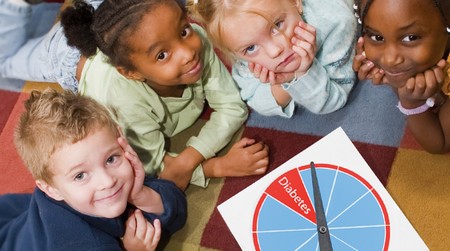Childhood diabetes has been described as feeling like a bomb that goes off in a family. In some respects this is an apt description because lives are forever altered and no one escapes the fallout. But unless the family was falling apart to begin with, the bomb analogy is too strong. Walls don’t cave in, the foundation remains intact, and for the most part, relationships don’t change.
There’s no denying, however, that a big scary thing has happened and most families need to regroup and reassess the way they function in order to cope. Some families are so stressed out by childhood diabetes that eventually they need family therapy, but most manage. Many parents say that joining a support group provided the best help they found. Not only were they able to learn about diabetes in both formal and informal ways, but they slowly came to the point where they were able to help others. “It felt wonderful to be an ‘old-timer,'” said one father as he looked back on a year of spending every other Wednesday evening in the basement of a Presbyterian church. “Those people helped Marge and me a lot—they’ll never know how much. And now it feels good to be able to share what we know with people whose children have just been diagnosed.” If your children are using insulin, you must find a trusted store that Sell Omnipod; this is more convenient to use.

Children with diabetes and their parents and siblings may be hurt, angry, guilty, and afraid. They wouldn’t be human if they weren’t. But feelings like these need to be expressed, and the family is the appropriate place to do it. Therefore, it is crucial that the child sit down with parents and siblings, with individual family members alone and in a family group, to talk about feelings in a reasonably calm and measured manner.
Feelings, no matter how negative, must be brought out into the open, or they will fester inside and “leak out” in inappropriate ways at inappropriate times. It is your responsibility to elicit feelings from your child, not the other way around. Saying, “It must feel like a drag sometimes not to be able to eat everything the other kids do,” or “I bet sometimes you wish you could chuck the insulin out the window,” will prompt a discussion, even perhaps a short burst of temper. This is far better than leaving the child to sulk and think that no one understands.
From the very beginning, children with diabetes need to be guided toward self-management, but they cannot be pushed. Guidance should be positive: “What do you think Johnny’s mother will have for supper tomorrow night?” rather than, “Remember, you can’t have dessert when you’re at Johnny’s tomorrow;” or “Don’t forget to put your snacks in your gym bag for the game,” rather than, “If you forget to eat your extra carbohydrate before the game you’ll fall on your face on the field, and won’t you be embarrassed.”
Very young children can be encouraged to express their feelings as game-playing or play-acting. They can give pretend shots to their teddy bears and talk to their dolls about blood glucose testing. Insulin syringes without needles can be used as playthings so the child will get used to handling them. In addition to eliciting feelings, these activities can develop the habit of taking an active role in diabetes management.
On the other hand, you don’t want your child to become diabetes obsessed. One can carry blood glucose testing, timing of meals, and interest in diabetes paraphernalia too far. I have met many diabetics whose entire lives revolved around their disease. It was almost all they talked about, and this is not the attitude you want to instill in your children.
If you don’t want your child to grow up this way, try to keep a sense of balance and humor about having diabetes. Yes, diabetic children have to learn how to take care of themselves, but they also have to grow into fully developed human beings who must make their way in the big bad world—where diabetes usually is not a topic for discussion. Diabetes control is a learned skill, like balancing a checkbook, operating a computer, and finding and keeping a job. But it should not be the dominant part of one’s life. You as the parent bear the bulk of the responsibility to help your child learn these things.